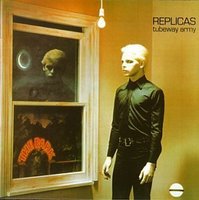Albums That Loved Me Back #2
In August 1996, my mother and I arrived in Austin, Texas in a U-Haul van. Stuck in gridlock on the southbound I-35 in the humid afternoon, my bladder on the verge of bursting, I didn't notice that we had just passed ABCD's, the store where I would spend many paychecks over the next few months.
I turned 19 a few days after we arrived. My mother, knowing little about me except that I was fanatical about music, gave me $100 to spend on CDs. The only good record store I knew was ABCD's, having purchased most of the Kraftwerk and Sisters of Mercy albums there while visiting Austin earlier in the year.
We went together. My mother would occasionally feign interest in what I was listening to, but would always dismiss my taste as too weird to learn anything about. We left the store with some music by Devo, Download, Alien Sex Fiend, black tape for a blue girl, and some others I don't remember. The album that left the greatest impression on me was Replicas, the sophmore album by Gary Numan's band, Tubeway Army.
Released in 1979, the same year as their debut, Replicas represented a pivotal departure from the generic punk sound of the demos that caught the attention of Beggars Banquet. Adapted from an unfinished sci-fi novel that Numan wrote in high school, Replicas used synthesizers to complement traditional rock instruments and create a futuristic, surreal new wave sound. The album told a story of robotic sexual companions and sadistic politicians that was, not coincidentally, reminiscent of the short stories of Numan's idol, Philip K. Dick. Replicas used the not-too-distant future as a setting for its themes of alienation and individuality. Ironically, though these themes formed the foundations of punk, the British music press mocked Numan for being flamboyant and odd compared to his peers.
These are the very qualities that got me hooked on Replicas. Though Numan chastized his contemporaries in punk for becoming soulless conformists, he expressed how I felt about American twenty-something gay men, or most of the ones I had ever known, anyway. In "Machman", Numan points a finger at those that would laugh at him for being different and accuses them of being instruments of oppression - the very "rape machines" described in "Down in the Park". The title track bemoans the institutionalized hostility towards individuality that was just as active in the punk scene of his time as it had been in the British school system when Numan first imagined the story.
I related his disillusionment to my own coming-out experiences. I tried to break free from society's insane notions of masculinity - only to find that the gay community's notions were even less realistic. Numan would certainly have recognized the masses of Abercrombie & Fitch clones that infested Roscoe's on a Saturday night as the same "machmen" he described.
In a way, Replicas accomplished what most science writers try to do but fail. Its fantastical story is rooted in themes that were relevant to its time - and are still relevant today. Without a coherent plotline or skillful character development, the album moves the listener as any Philip K. Dick story. For this reason more than any other, Replicas remains one of my favorite albums ten years later.



3 comments:
Nice.
But, don't tell me you grew up in Texas? It would be too spooky. And certainly not West Texas.
No, I grew up here. I only lived in Austin for a year and then came back.
Post a Comment